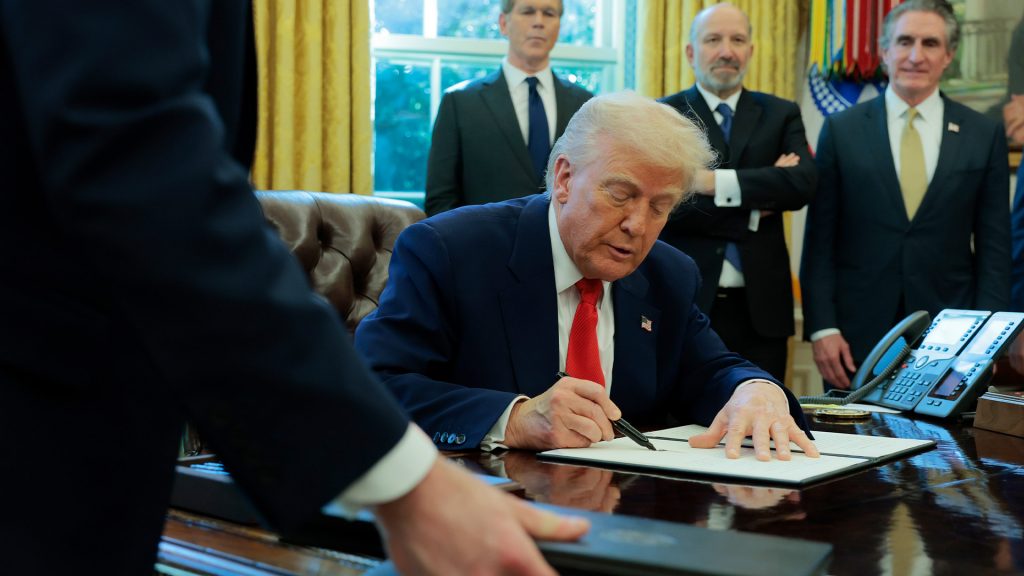Trump signs executive order targeting state climate laws
Ella Greene April 10, 2025 0
- President Trump signed an executive order directing the U.S. attorney general to identify and take action against state laws that hinder domestic energy use. The order claims state climate laws may be unconstitutional or preempted by federal law.
- The order targets climate policies in New York, Vermont and California, citing their alleged negative impact on national security and rising energy costs.
- In response, state leaders and industry representatives defended their policies, saying they “safeguard Americans’ fundamental right to clean air and water.”
Full Story
The Trump administration is targeting states with climate laws that it says are unconstitutional and go against the federal government’s energy agenda. Meanwhile, a coalition of 22 states is lobbing a similar accusation back at the White House, saying it cannot “unilaterally” strip states of their constitutional authority or rights.
Executive order targets state energy policies
President Donald Trump signed an executive order Tuesday, April 8, ordering the U.S. attorney general to identify and take action against state laws that burden the use of domestic energy and are “unconstitutional, preempted by federal law, or otherwise unenforceable.”
“Simply put, Americans are better off when the United States is energy dominant,” the order reads. “American energy dominance is threatened when state and local governments seek to regulate energy beyond their constitutional or statutory authorities.”
The attorney general must submit a report detailing actions to be taken within 60 days.
The order mentions energy laws in New York, Vermont and California, saying, “These state laws and policies weaken our national security and devastate Americans by driving up energy costs for families coast-to-coast, despite some of these families not living or voting in states with these crippling policies.”
States defend climate policies, industry responds
California has a “cap-and-trade” program designed to reduce greenhouse gas (GHG) emissions and combat climate change. The Golden State sets a limit, or a “cap,” on the total amount of GHG emissions allowed from various sectors, such as power plants, refineries and large industrial facilities. This cap declines each year, meaning total emissions must go down over time.
New York and Vermont have Superfund laws in place, which hold certain companies retroactively responsible for their greenhouse gas emissions. These companies are required to pay into the Superfund for their historic emissions. The money is then used to fund infrastructure projects, climate projects and upgrades to health facilities.
U.S. Climate Alliance co-chairs, New York Gov. Kathy Hochul and New Mexico Gov. Michelle Lujan Grisham, responded to Trump’s executive order in a statement, saying:
“The federal government cannot unilaterally strip states’ independent constitutional authority. We are a nation of states — and laws — and we will not be deterred. We will keep advancing solutions to the climate crisis that safeguard Americans’ fundamental right to clean air and water, create good-paying jobs, grow the clean energy economy, and make our future healthier and safer.”
Meanwhile, the American Petroleum Institute praised the order. In a statement, Ryan Meyers, senior vice president and general counsel for American Petroleum Institute, said:
“We welcome President Trump’s action to hold states like New York and California accountable for pursuing unconstitutional efforts that illegally penalize U.S. oil and natural gas producers for delivering the energy American consumers rely on every day. Directing the Department of Justice to address this state overreach will help restore the rule of law and ensure activist-driven campaigns do not stand in the way of ensuring the nation has access to an affordable and reliable energy supply.”
Related Stories
Ella Rae Greene, Editor In Chief
Ella Greene
Ella and the staff at Clear Media Project (CMP) curate these articles.
Unless otherwise noted CMP does not write these articles.
The views, thoughts, and opinions expressed in the articles published on this blog belong solely to the original authors and do not necessarily reflect the views of the blog owner. The blog owner does not claim ownership of the content shared by contributors and is not responsible for any inaccuracies, errors, or omissions.
All rights and credits goes to its rightful owners. No Copyright Infringement is intended. If you believe any content infringes on your rights, please contact us for review and potential removal.





